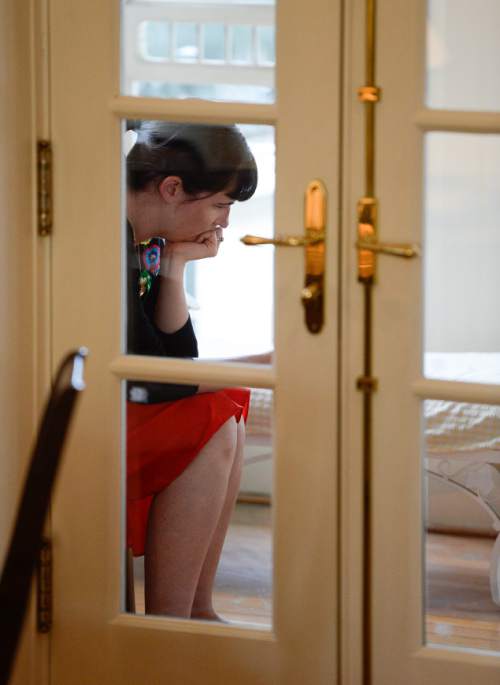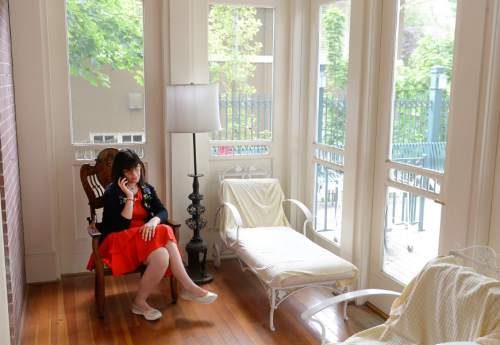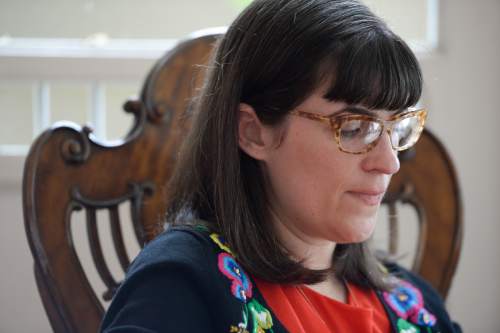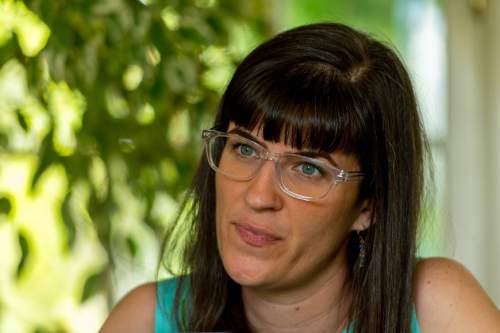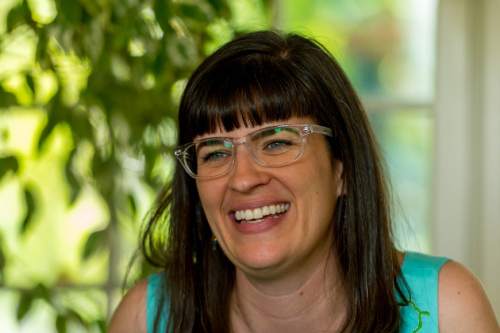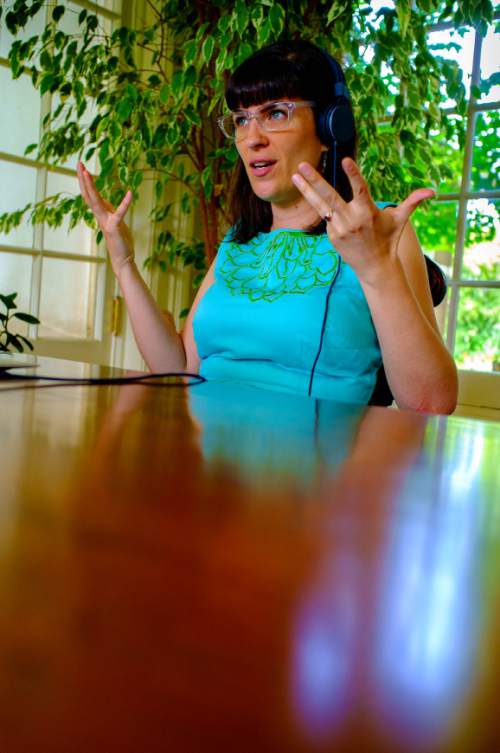This is an archived article that was published on sltrib.com in 2015, and information in the article may be outdated. It is provided only for personal research purposes and may not be reprinted.
Nancy Ross was sitting next to Kate Kelly at an Ordain Women board meeting in Salt Lake City on June 23, 2014, when Kelly learned that she had been excommunicated from the LDS Church.
Kelly began to tear up at the email from her Mormon bishop, and soon most of the nine or so board members around the table were weeping as well.
"It was a truly awful day — with a lot of really big emotions," Ross recalls. "A year later, it's still an awful thing."
Until that moment, Ross says, many of the women who had pushed for female ordination — including those who had marched with Kelly to seek tickets to the male-only priesthood session — did not believe the church they loved would take such punitive actions.
They were hopeful and, they conceded, naive.
Beyond the tiny ordination camp, however, many Mormon feminists also experienced Kelly's excommunication as a harsh slap felt around the world, not just to the activist, but to them all. They were shocked, horrified and discouraged that their carefully constructed building blocks of progressive LDS history seemed to have been toppled with a single blow.
"It's taken me about a year to really recover emotionally and spiritually," Ross says, "to gain perspective and to create some distance from the upset and anger and big emotions that day produced."
In the succeeding 12 months, Kelly has moved to Kenya, lost appeals to regain her church membership, worked for women's rights in Somalia, written opinion pieces for several newspapers, retained her seat on Ordain Women (OW) board and posted statements on its website.
Meanwhile, OW has uploaded more supportive profiles on its site, produced photos of women involved in imaginary healing blessings and promoted actions to educate and push Mormons toward greater gender equity.
The group plans a couple of unspecified mass actions July 24 during a Pioneer Day service at the Mormon Tabernacle and along the Days of '47 Parade route in Salt Lake City.
—
Turnover and tactics • Most observers, whether they support female ordination or not, credit OW with triggering wider conversations about women in The Church of Jesus Christ of Latter-day Saints.
But the group's executive board, which has turned over almost entirely since Kelly's excommunication, and its backers also have paid a price — in time, religious respectability and church standing. Some have lost callings, temple access, even friends.
South Jordan resident April Young Bennett, heeding her local LDS leader's demand, chose to resign from OW's board rather than lose the ability to attend her brother's temple wedding. Kristy Money learned this week she faces possible church discipline from her Atlanta area bishop on charges of apostasy for her writings and work with the group.
Whether from fear, burnout or altered perspectives, some have stepped away from the organization, some have quietly withdrawn their profiles, some have a different view of women's priesthood altogether.
And, for some, Kelly's post-excommunication persona and actions have created divisions over leadership and tactics.
Most, however, still prize the ultimate goal: female ordination.
"I do not think that the excommunication itself did a lot to thwart or enhance the ordination cause," says Suzette Smith, a former OW board member who continues to promote ordination. "The people who supported Kate still do; those who were opposed still are."
Smith, a Virginia-based businesswoman, loves OW for bringing the issue "to the forefront." No other feminists, she says, "do it as conscientiously, deliberately or as focused as OW does."
Still, different approaches have "been positive for the ordination cause," Smith says. "That spreads the effort out among different voices so people hear it and understand in a variety of ways."
A year ago, though, Kelly had by far the loudest, most quoted voice — and she suffered the deepest wound.
—
Building on the past • Kelly, a returned Mormon missionary and D.C.-based human-rights lawyer sporting signature specs and a conservative but quirky fashion sense, sprang into public awareness with the arrival of Ordain Women's website in March 2013.
Months before, Kelly had reached out to a network of Mormon feminists that had been working for gender-based equality for decades. Among the first calls in January 2013 was one to Lorie Winder Stromberg, a California Mormon who had been talking about women's issues since the 1980s and had more recently created an online petition, "All Are Alike Unto God," to spell out possible changes, including ordination.
In a series of conversations with feminist friends, Kelly became convinced that "whatever her goal, it had to be actionable," Stromberg writes in a forthcoming book of essays from various authors titled "Voices for Equality: Ordain Women and Resurgent Mormon Feminism."
And the action had to be big.
Kelly suggested unfurling a banner for women's ordination over a balcony in a session of the April 2013 LDS General Conference, Stromberg writes, but ultimately opted for trying to get tickets to the all-male priesthood session.
Once the group settled on the name Ordain Women and the website, the question became: Shall we allow nonparticipating, nonbelieving members or former members to post profiles?
Kelly was against it, but others swayed her and thus the site was born and open to all.
Today, about 650 such profiles appear, with about 70 percent to 80 percent coming from active Mormons, Money says.
After Kelly's excommunication, about a dozen asked to withdraw their posts.
The decision to open it to all interested parties, no matter their church status, was sound, Kelly acknowledges, since she now falls into the "former" category.
And, for better or worse, she remains the face of the movement.
—
Out of Africa • When Kelly and her husband, Neil Ransom, arrived in Nairobi a few months after her church ouster, the pair went to an LDS ward, or congregation, there for a few weeks.
The Mormons were friendly and didn't really understand her disciplining, Kelly says. A church employee there said he would resign rather than excommunicate her.
Since then, the couple have stopped attending and when the faith's governing First Presidency rejected Kelly's final appeal, Ransom resigned his membership.
"I don't know where my path will lead me," Kelly says in a phone interview. "My spirituality in many ways is less restrained. ... My excommunication has freed me from the in-or-out, black-or-white mentality many Mormons have and that the church demands."
Not much has changed in her daily behavior.
"My marriage is not breaking down. I am a basic moral personal," she says. "I don't have any reason not to go out and drink and do all these other things, but I've realized it wasn't because of Mormonism. It's a strange process of sussing out what you really value."
The day after being booted from the church, for example, Kelly was photographed in a sleeveless shirt. (LDS leaders instruct excommunicated members to stop wearing Mormon temple garments that cover a woman's shoulder.)
"Is a capped sleeve better than a tank top?" Kelly laughs, calling the ruckus "dress-gate." "Those are the kinds of things I am going through the process of discovering. But I'll probably never drink a cup of coffee. I don't even like the smell of coffee."
She keeps a keen eye on the continuing campaign and the choices confronting her allies. Bennett, for example, gave up her OW board membership rather than her LDS temple recommend.
"It's not the decision I would have made, but what a ...terrible position [she was in]," Kelly says. "That is the stuff of totalitarian regimes."
Kelly made a similar point in February 2015, writing in The Guardian that "since strict obedience is demanded and harshly enforced, only the least talented, least articulate, least nuanced thinkers, least likely to take a stand against abuse, and the least courageous people thrive in the church today."
Though the statement alienated some LDS supporters, Kelly stands by it. "It was taken as an insult to all active members, but it was intended as more of a statement about the institution."
Kelly withdrew from the "Voices for Equality" book, explaining that she felt she wouldn't have "enough input."
"If you have experienced a traumatic event, part of taking back your power is the ability to control your narrative and own that story," Kelly says. "The organization is just 2 years old. ... Doing a history seems extremely premature. I am still making the history to write about."
—
Into the future • OW galvanized a feminist drive that had been building for decades.
"In some ways, Ordain Women tested the bounds of faithful dissent, " Stromberg says, "with some tolerating and even supporting [dissent] and others disciplining women."
LDS leaders knew what they were doing by punishing Kelly, says Money, who could meet a similar fate.
"It was strategic to paint us as apostates," Money says."They wanted to contain the movement. And while that did not happen, OW supporters have received a lot of pushback from families and wards."
At the same time, Mormon feminists also have become "braver and bolder," she says. They know how high the stakes are and "how wrong Kate's excommunication was."
Ross, who left OW's board because of the time commitment, believes the public conversation is beginning to change minds.
The St. George professional is hopeful, she says, and "it's not the hope of fools."
Twitter: @religiongal


